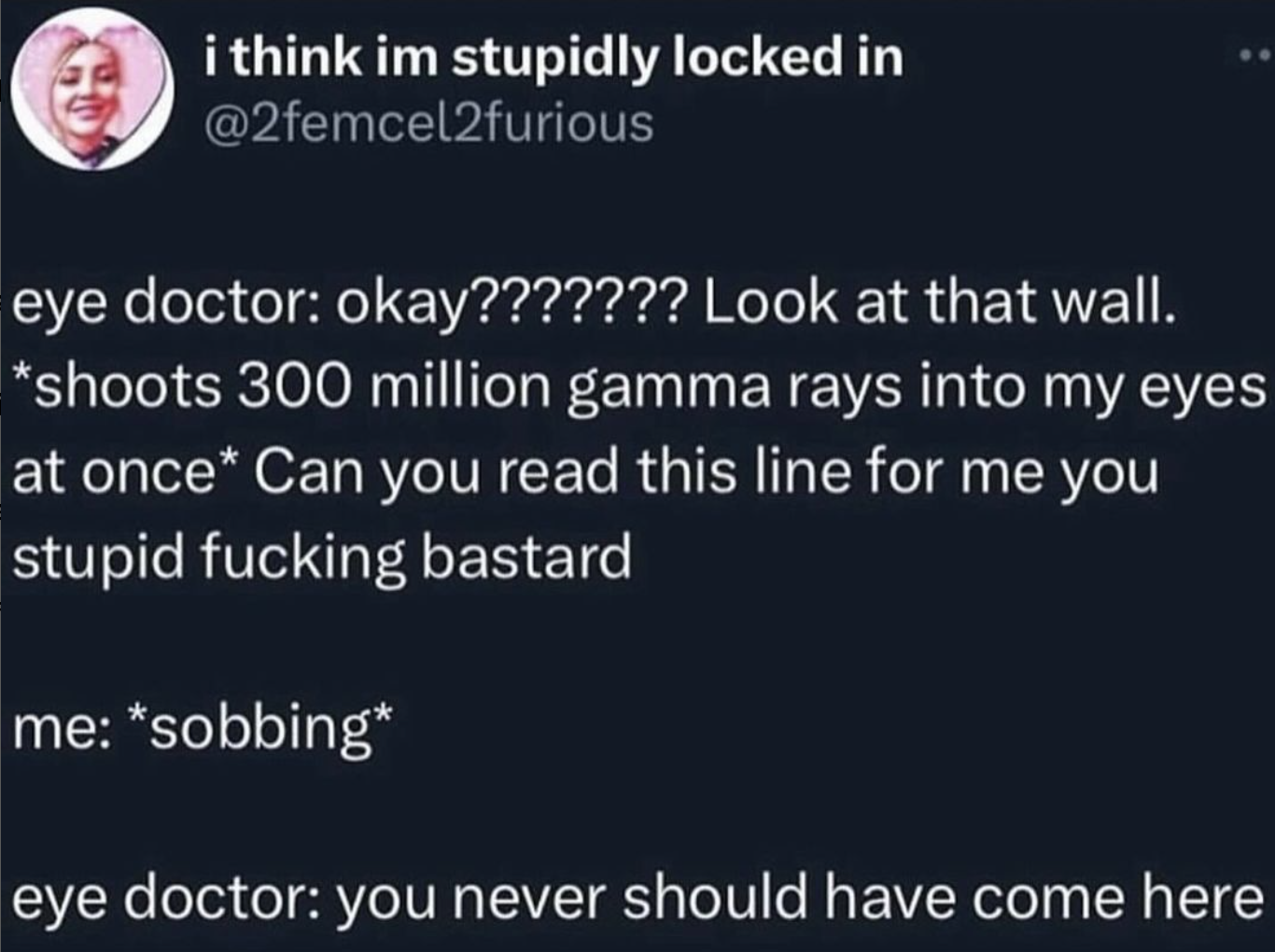this post was submitted on 06 Jul 2024
384 points (92.1% liked)
People Twitter
5425 readers
2415 users here now
People tweeting stuff. We allow tweets from anyone.
RULES:
- Mark NSFW content.
- No doxxing people.
- Must be a pic of the tweet or similar. No direct links to the tweet.
- No bullying or international politcs
- Be excellent to each other.
- Provide an archived link to the tweet (or similar) being shown if it's a major figure or a politician.
founded 2 years ago
MODERATORS
you are viewing a single comment's thread
view the rest of the comments
view the rest of the comments

An opthalmologist is an eye doctor. They go to medical school and do a residency for extra training. Optometrists have doctorates in optometry meaning they do four more years of school after their bachelor's. They can call themselves doctor because in the US that's the convention for doctorate's (in Europe ony medical doctors use the term). There's avast difference in intensity, depth, bredth, etc. of training between the two. It's easy to miss the difference if you're not familiar with the system.
You’re right about the differing educational requirements, but optometrists are just as much an eye doctor as an ophthalmologist. They just fulfill different roles.
Optometrists do four years of optometry school (the fourth of which is entirely supervised practice) and pass a series of licensing exams. Many optometrists also complete residencies to further specialize. They typically see patients on a regular basis to monitor eye health, provide contacts and glasses, and treat some diseases.
Ophthalmologists go to medical school, and then further specialize in eyes. They tend to treat more serious diseases and injuries, especially when they require surgery (or injections, depending on the state).
I guess I would compare the difference as similar to a dentist versus an oral surgeon. Both doctors, both valuable and knowledgeable components of the healthcare system, just filling different roles.
I disagree with the use of doctor for anyone who hasn't completed medical school and their field's respective post-graduate training. I've seen the term watered down to the point that anyone tangentially related to a physician-led field uses the term. Chiropractors, nurse practitioner, administrators, etc. etc. It leads to confusion in patient populations. I've had patients in the ER tell me that their nurse practitioner was equivalent to me in temrs of training which is absolutely not the case. I finished 3,000 hours of clinical rotations by the end of med school and another 10,000 hours of training by the end of residency. Patients are lucky if an NP has 500 hours of clinicals before they're hired to provide "primary care". The training an optometrist has is specialized but not to the level of an opthalmologist so using the same term muddies the water and makes it difficult for people to discern the difference.
I appreciate the distinction, but educating the masses on this particular point is an effort in futility. As an ophtho doc, I have no problem with optometrists being called eye doctors. Most ppl can't tell me the difference between their PCP MD and the PA who actually sees them at each check up. Personally I draw the line at chiropractors, though I do believe some of them provide truly beneficial treatments.
You may be right a out that but I'll keep trying. I've seen some truly egregious care provided by midlevels who were hired for primary care because hospital admins only care that midlevels can bill 80% of a physician but they only have to be paid a third of a physician salary. Unfortunately people aren't able to differentiate between all the people in scrubs that they see so I recommend supporung Physician for Patient Protection , a great organization that lobbies against unsuper mid-level practice.
And as for chiropractors? I have little against them except for neck adjustments and adjusting childre. Necks are fragile and so are the arteries in it and kids are the just straight up flexible, they don't need placebos to feel better.